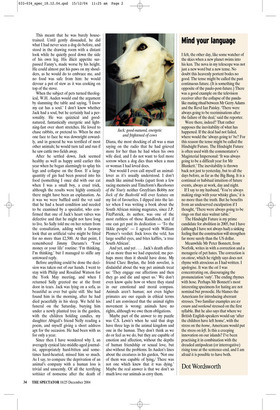Mind your language
I felt, the other day, like some watcher of the skies when a new planet swims into his ken. The nova in my telescope was not just a new word but a new tense. No doubt this heavenly portent bodes no good. The tense might be called the past continuous future. (It is something the opposite of the paulo-post-future.) There was a good example on the television receiver after the collapse of the pandalike mating ritual between Mr Gerry Adams and the Revd Ian Paisley. ‘There were always going to be recriminations after the failure of the deal,’ said the reporter.
Were there, indeed? That rather supposes the inevitability of what has happened. If the deal had not failed, where would the ‘always going to’ be? For this reason the tense might be called the Hindsight Future. The Hindsight Future is often used with the commentator’s Magisterial Impersonal: ‘It was always going to be a difficult year for Mr Blunkett.’ The inevitability is thrown back not just to yesterday, but to all the days before, as far as the Big Bang. It is a continual or habitual intuition of future events, always at work, day and night.
If I say to my husband, ‘You’re always making rings with your whisky glass,’ it is no more than the truth. But he benefits from an undeserved exculpation if I thought, ‘There were always going to be rings on that nice walnut table.’ The Hindsight Future is my prime candidate for abolition in 2005, but I have (although I have not always had) a sinking feeling that the construction will strengthen far more surely than the US dollar.
Meanwhile Mr Peter Bonnett, from Norfolk, writes in with a correction and a menagerie of pet hates. The correction is on otiose, which he rightly says does not rhyme with atrocious as I had written. I apologise. It was the oti I was concentrating on, discouraging the pronunciation ‘oaty’. The ending rhymes with hose. Perhaps Mr Bonnett’s most interesting specimens for hating are not nominal but prosodic. He blames the Americans for introducing aberrant stresses. Two familiar examples are ice cream and weekend stressed on the first syllable. But he also says that where we British English-speakers would say ‘after the children have left home’, with the stress on the home, Americans would put the stress on left. Is this a creeping innovation on our islands? I’ve been practising it in combination with the dreaded antipodean (or interrogative) rising tone at the sentence-end, and I am afraid it is possible to have both.
Dot Wordsworth

















































































 Previous page
Previous page